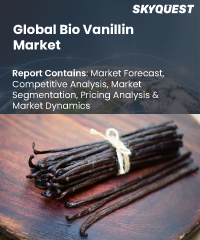
Report ID: SQMIG15E2355

Report ID:
SQMIG15E2355 |
Region:
Global |
Published Date: April, 2024
Pages:
184
|
Tables:
61 |
Figures:
75
Global Bio Vanillin Market size was valued at around 213.40 million in 2023 and is expected to rise from USD 228.12 million in 2024 to reach a value of USD 363.94 Million by 2031, at a CAGR of 6.8% during the forecast period (2024–2031).
In the food and beverage industry, demand for flavours and essences made from natural sources is skyrocketing. Customers are more concerned with living healthy, active lifestyles and want natural and plant-based goods and components. The pattern is anticipated to persist throughout the ensuing years, indicating an increase in the consumption of bio vanillin in the approaching years. Food manufacturers and other non-food industries, such medicines and fragrances, are using bio vanillin more frequently as a result of the growing food and beverage sector, which includes the food services sector, bakery, and others.
Over synthetic vanillins like ethyl vanillin and other chemical-based vanillin, the product is receiving a remarkably positive response. Because of the global expansion of numerous food industries and non-food industries, the demand for bio vanillin is anticipated to increase throughout the projected years (2019–2026). Because of its limited market availability, the growing popularity and demand of bio vanillin among consumers are predicted to encounter obstacles. In addition to acting as a restraint on the worldwide market for bio vanillin, the increased price of raw materials has an impact on the price of the finished product on the market.
US Bio Vanillin Market is poised to grow at sustainable CAGR for the next forecast year.
Our industry expert will work with you to provide you with customized data in a short amount of time.
REQUEST FREE CUSTOMIZATIONBio Vanillin Market size was valued at USD 199.25 million in 2022 and is poised to grow from USD 213 million in 2023 to USD 363.24 Million by 2031, at a CAGR of 6.9% during the forecast period (2024–2031).
A number of flavour and fragrance ingredient producers, including Firmenich, Givaudan, and International Flavors & Fragrances, are forming alliances with synthetic biotechnology firms to create microbial cell technology, which would serve as a new manufacturing platform for the biosynthesis of various high-value fragrance or flavour molecules. Throughout the course of the projection period, this is anticipated to be a crucial development. 'Solvay SA (Belgium)', 'Givaudan SA (Switzerland)', 'Firmenich SA (Switzerland)', 'Evolva Holdings SA (Switzerland)', 'Advanced Biotech (United States)', 'Borregaard (Norway)', 'Jiaxing Zhonghua Chemical Co., Ltd. (China)', 'Prinova Group LLC (United States)', 'Lesaffre (France)', 'Synerzine (Netherlands)', 'Aurochemicals (United States)', 'Shanghai Xinjia Food Additive Co., Ltd. (China)', 'Ennolys (France)', 'Anhui Bayi Chemical Industry Co., Ltd. (China)', 'Jiaxing Nice Chemicals Co., Ltd. (China)', 'Nutra Food Ingredients LLC (United States)', 'Anhui Fengle Perfume Co., Ltd. (China)', 'Xiamen Hisunny Chemical Co., Ltd. (China)', 'Guangdong Sino Flavor Ingredients Co., Ltd. (China)', 'Zhongbei Northland Bio-Chem Industry Co., Ltd. (China)'
There is a growing consumer preference for natural and sustainable ingredients in food, beverages, pharmaceuticals, and fragrances. Bio vanillin, being derived from renewable sources and produced through biotechnological processes, is considered a natural and sustainable alternative to synthetic vanillin. The increasing demand for natural and sustainable flavors is driving the growth of the bio vanillin market.
With sustainability becoming a key concern for consumers and stakeholders, many bio vanillin manufacturers are emphasizing sustainable sourcing practices, including responsible agriculture, fair trade, and transparent supply chains. Traceability and certification of bio vanillin as organic, non-GMO, and sustainable are becoming important factors influencing purchasing decisions, leading to increased demand for certified bio vanillin.
The demand for bio vanillin in the Asia Pacific region, which topped 60 tonnes, dominated the market. Due to the increased demand for flavours from the bakery and confectionery sector, emerging markets like India, China, Malaysia, Vietnam, and Indonesia are anticipated to significantly contribute to the growth of the industry throughout the projection period.
Want to customize this report? This report can be personalized according to your needs. Our analysts and industry experts will work directly with you to understand your requirements and provide you with customized data in a short amount of time. We offer $1000 worth of FREE customization at the time of purchase.

Report ID: SQMIG15E2355